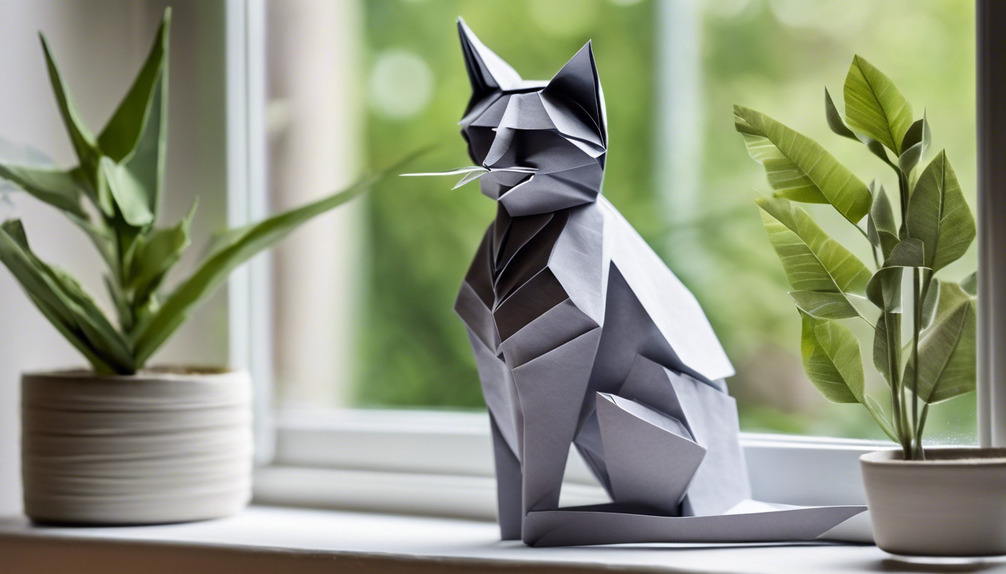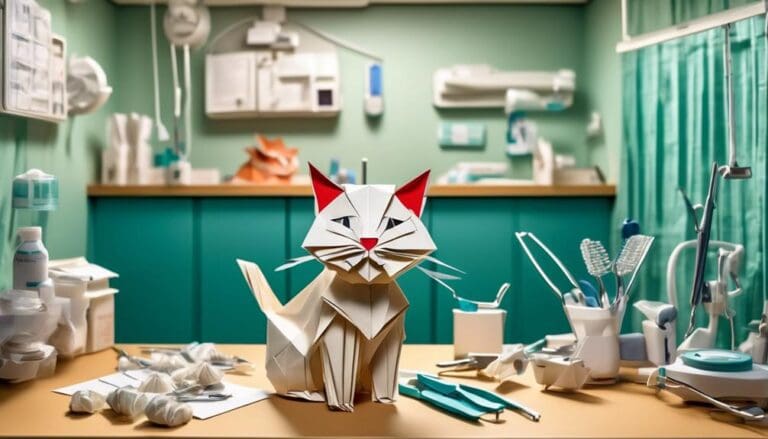As your beloved cat gracefully ages, you may notice subtle changes in their behavior and health. Among these changes, maintaining their dental care becomes increasingly crucial. You want to ensure that your older cat remains comfortable and free from oral pain.
With five essential dental care tips specifically tailored for senior cats, you can provide the best possible care for your aging cat. These tips not only address current dental concerns but also preemptively safeguard against potential issues in the future.
Key Takeaways
- Regular vet visits for professional teeth cleaning are crucial for senior cats with dental issues.
- Daily at-home dental care, including brushing with cat-specific toothpaste and toothbrush, is important for maintaining dental health in older cats.
- Incorporating dental treats into the diet (up to 10%) can help promote oral hygiene in senior cats.
- Using oral washes or water additives can provide additional support in maintaining dental health for older cats.
Signs of Dental Disease in Senior Cats
If your senior cat is experiencing dental disease, you may notice signs such as bad breath, tooth discoloration, difficulty eating, drooling, or pawing at the teeth or mouth. It can be distressing to witness your beloved cat struggling with these issues.
Senior cats are particularly susceptible to dental issues, and maintaining their oral health is crucial for their overall well-being. Dental problems can lead to weight loss, discomfort, and even systemic health issues if left untreated. It’s important to keep an eye out for any signs of dental disease so that you can address them promptly.
Your cat’s teeth and oral health are essential for their overall health and happiness. Dental care tips for senior cats include regular dental check-ups, providing dental treats or toys, and brushing their teeth regularly. These simple steps can help maintain your cat’s oral health and prevent dental disease.
Proactive Care for Age-Related Dental Issues
Addressing age-related dental issues in senior cats requires consistent proactive care to ensure their oral health and overall well-being. As your cat ages, their dental health becomes increasingly important.
Here are some proactive care tips to keep your senior cat’s teeth and gums healthy:
- Regular Vet Visits: Schedule routine vet visits for professional teeth cleaning to prevent age-related dental issues.
- At-Home Dental Care: Incorporate daily dental care routines, such as brushing your cat’s teeth and providing dental treats, to maintain their dental health.
- Dietary Adjustments: Introduce dental treats into your cat’s diet, making up to 10% of their daily food intake, to help prevent age-related dental problems.
- Oral Washes and Water Additives: Use oral washes or water additives to prevent the buildup of bacteria and maintain your senior cat’s dental hygiene.
- Consistent Monitoring: Keep a close eye on your cat’s dental health and seek immediate veterinary attention if you notice any signs of dental problems.
Taking a proactive approach to your senior cat’s dental care is crucial for promoting their overall health and ensuring a comfortable and happy life. By implementing these proactive measures, you can help your beloved cat maintain strong and healthy teeth as they age.
Caring for Senior Cats With Dental Problems
When caring for a senior cat with dental problems, it’s essential to prioritize regular vet visits for professional teeth cleaning to ensure their oral health and overall well-being. Dental disease affects older cats, leading to issues like plaque and tartar buildup, periodontal disease, and discomfort in their teeth and gums.
To care for your senior cat’s dental problems, consider using cat toothpaste and a cat-specific toothbrush to keep your cat’s mouth clean. Daily at-home dental care is crucial, including brushing and providing dental treats, oral washes, or water additives to prevent further dental problems. Wet foods can be considered to ease chewing for senior cats with dental issues.
Proactive care is also vital, so ensure your senior cat receives daily dental care to prevent age-related dental problems. Remember that anesthesia is necessary for dental cleanings and procedures in senior cats, and thorough planning and appropriate anesthetic plans ensure their safety.
Your commitment to caring for your senior cat’s dental health will greatly contribute to their comfort and well-being.
Dental Care Products for Senior Cats
To ensure the best dental care for your senior cat, incorporating essential dental products into their daily routine is crucial for maintaining their oral health and overall well-being. When it comes to your cat’s dental health, it’s essential to make sure you have the right products for their oral hygiene needs.
Here are some important items to consider:
- Cat toothbrush and toothpaste: Regular brushing with cat-specific toothbrush and toothpaste is crucial for preventing dental issues.
- Dental gel, oral rinses, and water additives: These can be used as alternatives to traditional toothpaste, especially if your cat isn’t comfortable with brushing.
- Dental diets, treats, chews, and toys: Look for products specifically designed for senior cats to support their dental health.
- Soft-bristled toothbrushes and VOHC-approved toothpaste: Opt for gentle toothbrushes and toothpaste approved by the Veterinary Oral Health Council for effective teeth cleaning.
- Safe chewing bones, oral maintenance powder, and supplements: These can help in maintaining your senior cat’s dental health and preventing dental problems.
At-Home Dental Care Tips for Senior Cats
Incorporating the dental care products mentioned earlier into your senior cat’s daily routine can significantly contribute to their oral health, but it’s equally important to implement at-home dental care tips for their overall well-being. Daily brushing with cat-specific toothpaste and toothbrush is crucial for maintaining good oral health.
Incorporating dental treats into your cat’s diet, up to 10%, can help reduce plaque and tartar buildup. Consider using oral washes or water additives to prevent bacteria buildup and promote better oral health. Schedule regular vet visits for professional teeth cleaning to address any underlying dental issues.
Taking a proactive approach will ensure a long, healthy life for your senior cat.
| At-Home Dental Care Tips for Senior Cats | Benefits |
|---|---|
| Daily brushing with cat-specific toothpaste and toothbrush | Helps maintain healthy teeth |
| Incorporating dental treats into your cat’s diet | Reduces plaque and tartar buildup |
| Using oral washes or water additives | Helps prevent bacteria in the mouth |
| Scheduling regular vet visits | Ensures proper dental care |
Frequently Asked Questions
How Do You Take Care of an Older Cat’s Teeth?
To take care of an older cat’s teeth, start by brushing daily, providing dental treats, and wet food. Regular vet visits for professional cleanings are crucial. Be proactive to prevent painful dental issues and serious health complications.
Should I Have My 15 Year Old Cats Teeth Cleaned?
Absolutely! Regular dental cleanings can prevent pain, infection, and other health issues. Your vet can provide guidance on the best approach to ensure your cat’s dental health.
Can a 17 Year Old Cat Have Dental Surgery?
Yes, a 17-year-old cat can have dental surgery. Your veterinarian will assess the risks and benefits and provide proper pre-operative evaluation and care. Senior cats may need additional monitoring and post-operative care for a successful outcome.
Can a 17 Year Old Cat Have Tooth Extraction?
Yes, tooth extraction is safe for senior cats when performed by a skilled veterinarian. Anesthesia is necessary for their comfort and safety during the procedure. Proper monitoring ensures their well-being. It’s important for their overall health.




